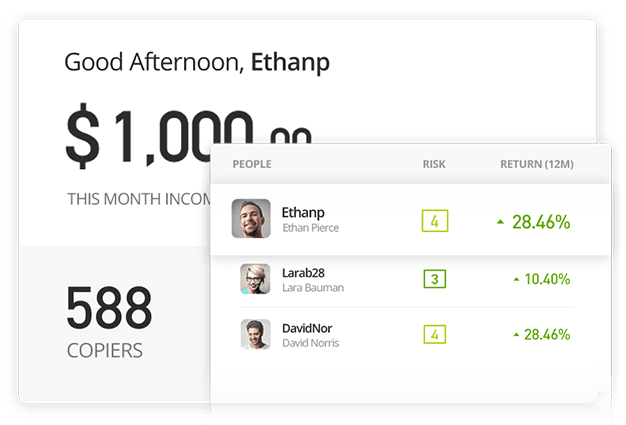eToro provides investors, from beginners to experts, with a comprehensive crypto trading experience, on a powerful yet user-friendly platform
Build your ultimate crypto portfolio
- Invest in a wide variety of leading cryptocurrencies.
- Follow each coin’s trends with advanced charts and analysis tools
- Create a custom Watchlist and stay informed with real-time updates
- Staking service – Grow Your Crypto While You HODL
Never trade crypto alone
eToro is much more than just a place to trade. Use award-winning social trading features to connect with over 25 million users worldwide and find top-performing crypto traders to copy with CopyTrader™.
*Copy Trading does not amount to investment advice.

Payment Methods
Buy cryptocurrency without deposit fees via a wide variety of payment options.









No deposit fees apply to deposits in USD. Other fees may apply when transacting and/or withdrawing funds. For more information, please see eToro’s pricing structure here.
Start trading crypto
-

Real-time insights
Traders on eToro receive free access to the latest crypto market research & news
-

Customised risk management
Set Stop Loss and Take Profit parameters to suit your strategy and automatically protect your investments
-

Practice with $100K
Try out all of the features on eToro’s trading platform risk free with $100,000 in a virtual portfolio
Your crypto, your way
The cryptocurrency that you invest in on the eToro trading platform can easily be transferred to the eToro wallet at any time, for seamless usability of your digital assets.

Ready to get started trading crypto on eToro?
FAQ
Cryptocurrency is a way to trade currency and other assets digitally, independent of any third-party entity, such as a government or bank. These transactions take place on a decentralised ledger system called the blockchain. The first crypto was Bitcoin, and it remains a leading digital currency, along with Ethereum, XRP, and others.
A blockchain is a decentralised digital ledger where encrypted data can be transferred securely, making it nearly impossible to duplicate or counterfeit. This ledger is the foundation of any cryptocurrency transaction.
Read more about how the blockchain works here.
Staking is a process that allows rewards to be earned by holders of a specific coin.
Staking derives from the PoS (Proof-of-stake) mechanism, used by a distributed blockchain network, where blockchain miners can mine or validate block transactions according to how many coins they have. The more coins they hold, the more mining power they have. Staking rewards are shared with users who own the cryptoassets (like eToro and our clients) and who delegate their voting rights to staking pools. The more validations that are delegated to a staking pool, the higher chance of being elected to produce the next block, and the more rewards likely to be received.
Cryptocurrencies can be traded in two ways. Either you purchase the actual tokens and trade them on a cryptocurrency platform, or you trade derivatives based on the underlying cryptocurrency price. Depending on local regulations in your country of residence, you can do one or both on the eToro platform.
Read more about how to buy cryptocurrencies here.
eToro offers a wide variety of the world’s most popular cryptocurrencies and is constantly making more coins available for trading. Our current offering includes:
- Bitcoin (BTC): The largest cryptocurrency by market cap, considered to be the first wide-scale implementation of blockchain technology.
- XRP by Ripple Labs (XRP): This popular cryptocurrency enables real-time payments with greater transaction speeds and lower costs, and is already in use by many well-known brands.
- Ethereum (ETH): This leading cryptocurrency has received international recognition from technology giants such as Microsoft and Intel. In addition to payments, Ethereum also supports “smart contracts.”
- Bitcoin Cash (BCH): A ‘hard fork’ designed to be a solution to the transaction backlog Bitcoin was experiencing, Bitcoin Cash’s block size is eight times that of Bitcoin.
- Ethereum Classic (ETC): Although Ethereum Classic has a significantly lower market cap than its namesake, it is still a popular cryptocurrency.
- Litecoin (LTC): The first cryptocurrency to implement SegWit, a method of speeding up transaction times without compromising the underlying blockchain technology.
- Dash (DASH): Based on Bitcoin’s technology, Dash’s additional infrastructure enables faster transactions and higher liquidity, though unlike other cryptocurrencies, Dash is a decentralised autonomous organization (DAO).
- Stellar Lumens (XLM): Operating on a unique consensus algorithm rather than mining, Stellar can facilitate transactions between multiple currencies, whether fiat or digital.
- NEO (NEO): Also known as the ‘Chinese Ethereum,’ NEO was designed to be easily modified and to have no forking ability.
- EOS (EOS): Upon its release, EOS quickly became one of the top ten cryptos, with a powerful open-source infrastructure capable of supporting thousands of commercial-scale decentralised applications (DApps).
- Cardano (ADA): Inspired by Ethereum, Cardano differentiated itself with a dual-layer structure running each layer separately, as opposed to Ethereum, where both layers are intertwined.
- IOTA (MIOTA): Based on a proprietary ‘blockless’ blockchain called Tangle, IOTA is paving the way for a decentralised network to power the Internet of Things (IoT).
- Zcash (ZEC): Zcash encrypts the contents of shielded transactions, ensuring that the sender, recipient, and amount transferred are all kept private.
- TRON (TRX): Tron aims to create a decentralised alternative for digital content distribution via one of the largest blockchain-based operating systems in the world.
- Tezos (XTZ): Tezos’ ICO in September 2018 was one of the largest in crypto history, raising a record-breaking $232 million.
- Binance Coin (BNB): BNB is a utility cryptocurrency allowing users to unlock discounts on exchange fees for transactions made on the Binance exchange.
- Compound (COMP): This decentralized finance (DeFi) protocol runs directly on the Ethereum blockchain enabling users to access various financial services such as borrowing and lending, while rewarding them with COMP tokens.
- Chainlink (LINK): This tradable token is used to pay for transactions on the Chainlink network, a decentralized platform which enables smart contract agreements between oracles, or outside data sources, and the blockchain.
- Uniswap (UNI): A decentralized, open-source crypto exchange which runs on the Ethereum blockchain, Uniswap utilises a user-based pool of liquidity providers, or automated liquidity protocol, to solve liquidity problems which most centralized exchanges suffer from.
- Yearn.finance (YFI): A unique decentralized finance (DeFi) network providing staking pools, lender aggregation, yield generation and insurance on the Ethereum blockchain.
- Dogecoin (DOGE): Originally created as a satire, but quickly gaining popularity on social media, Dogecoin is named for an internet meme featuring a Shiba Inu dog.
- Aave (AAVE): Like other DeFi applications built on the Ethereum network, Aave uses smart contracts to facilitate decentralized lending services.
- Algorand (ALGO): This open-source, decentralized blockchain network features exceptional speed and a unique Proof-of-Stake (PoS) consensus mechanism which rewards all ALGO coin holders.
- Decentraland (MANA): Powered by Ethereum, Decentraland is a decentralized virtual reality gaming platform where users can buy, sell and otherwise monetize virtual plots of land as fully owned non-fungible tokens (NFTs).
- Basic Attention Token (BAT): A utility token created for digital advertising transactions on the privacy-focused Brave browser, using the Ethereum blockchain.
- Polygon (MATIC): This open-source protocol aims to be a hub for connecting compatible blockchain networks to the Ethereum network, leveraging its security and speed, via smart contracts.
- Spark (FLR): The native token of the Flare network, designed to offer Ripple’s XRP Ledger, as well as other blockchains, and smart contract functionality, which they do not natively support.
- Maker (MKR): An Ethereum-based smart contract platform that functions as a framework for both the DAI stablecoin and the MKR token.
- Enjin (ENJ): This blockchain-based gaming platform uses virtual worlds to create an Ethereum token-based ecosystem and directly back the value of non-fungible tokens (NFTs).
- Shiba (SHIBxM): Designed to support a fan-favourite dog breed, this meme-based crypto is offered on eToro as SHIBxM, which represents one million Shiba units.
See the full selection of cryptoassets, including crypto crosses, here.
You can easily transfer cryptocurrency from your portfolio to the eToro Wallet. Go to the Portfolio screen on the platform and click on the relevant open position. The option to transfer will appear in the ‘Edit Trade’ screen under ‘Invested amount.’ A pop-up window will appear showing the amount of units in the trade, the fee for executing this transaction, and the final amount of units (coins) that you will receive in your wallet.
For more detailed information, click here.
View more Frequently Asked Questions about crypto trading on eToro here.


